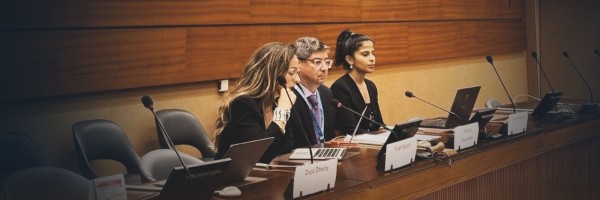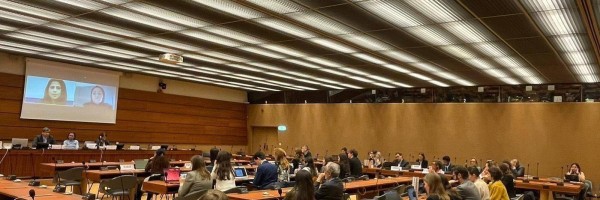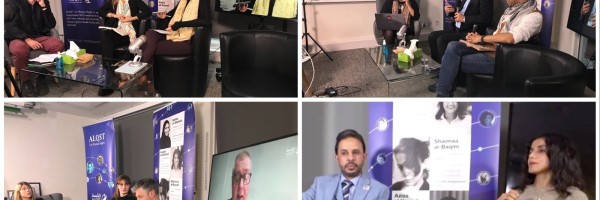At ALQST’s annual conference, held on 10 December 2019 (Human Rights Day) at the Frontline Club, titled "human rights in Saudi Arabia, current trends and ways forward", speakers including from Reporters Without Borders (RSF), English Pen, International Federation for Human Rights (FIDH), Gulf Centre for Human Rights (GCHR), Amnesty International, the European-Saudi Organisation for Human Rights (ESOHR), Campaign Against Arm Trade (CAAT), MENA Rights Group and ALQST discussed the human rights crisis in Saudi Arabia and the need for the international community to call for accountability.
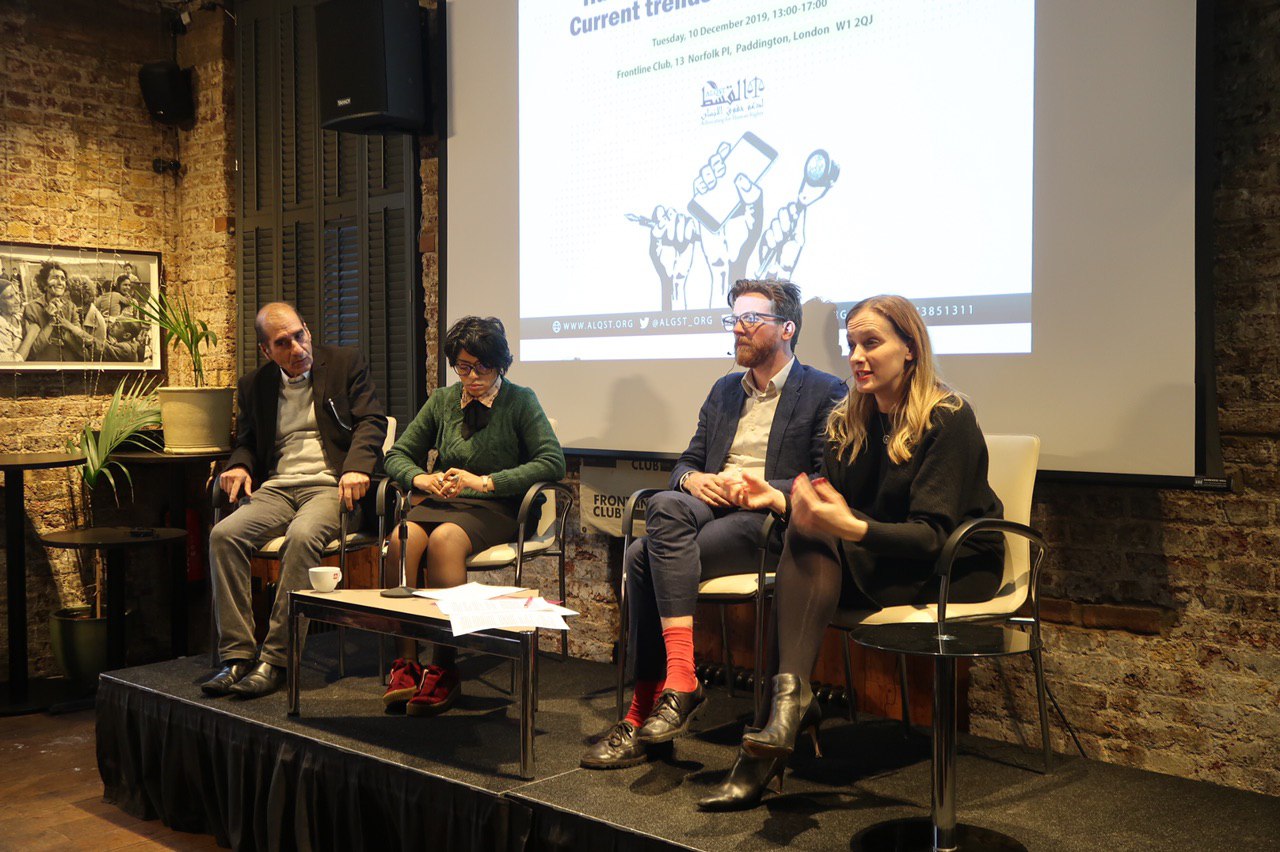
Session one: the crackdown on civil society and dissent
In the first session (moderated by ALQST’s Omaima Al Najjar), which looked at the crackdown on civil society and dissent, Rebecca Vincent, Director of Reporters Without Borders’ (RSF) UK Bureau, outlined the dire state of press freedom in Saudi Arabia, which dipped into the world’s bottom ten for the first time (172/180) in RSF’s 2019 World Press Freedom Index. 32 journalists are currently in prison, and in April 2019 RSF undertook an unprecedented mission to Saudi Arabia advocating for their release. So far Saudi Arabia has not shown any signs of abiding by this call.
Vincent argued that Saudi Arabia has not learnt any substantive lessons from the murder of Jamal Khashoggi, and called on the international community to do more, such as by following up UN Special Rapporteur Agnes Callamard’s recommendations to launch an international investigation into the murder. This includes the UK, which despite strong rhetoric on global media freedom in 2019, has often been reluctant to take action. Looking forward, Vincent raised the upcoming G20, which Saudi Arabia recently assumed the presidency of, and which takes place in November 2020, and that RSF will be using the summit as a hook to push for reform.
Daniel Gorman, Director of English Pen, began by introducing PEN, one of the oldest human rights organisations in the world, made up of “writers working on behalf of writers” and with over 100 branches. In terms of the organisation’s work on Saudi Arabia, while writers these days are not having their books banned like in the past, many are now in prison, charged with cyber-crimes, including prominent cases like Raif Badawi, Waleed Abu al-Khair, and Fahd al-Fahd. Some of PEN’s work includes campaigns, advocacy, holding public events and hosting PEN literary awards, which Raif Badawi and Waleed Abu al-Khair were winners of in 2015 and 2018 respectively.
To attempt to improve its reputation, Gorman pointed out that the Saudi government uses art to cover up human rights abuses committed, with events like the Riyadh and Jeddah international book fairs. Outside of Saudi Arabia, further cultural organisations have been established, such as the Mist Art Institute, which is owned by the Saudi royal family. To counter this “arts washing”, PEN has published a list of guidelines for writers and artists around the ethics of attending international events in countries with poor human rights records.
Anissa Daboussi, MENA Desk Programme Officer at the International Federation for Human Rights (FIDH), a global organisation with over 180 member organisations (including ALQST), spoke about Saudi women human rights defenders (WHRDs) and referred to an FIDH report published in January 2018 on the situation of women human rights defenders in Saudi Arabia. Daboussi described how women face dual challenges in the form of patriarchal repression and repression of the regime, including harassment, arrest, travel bans, and yet many have bravely taken action to advocate for human rights.
Since the publication of the report, WHRDs have faced a wave of arrests, systematic torture and many are now facing trial. At the same time, the authorities have also enacted small concessions on women’s rights, including the ability to travel without a male guardian, but such reforms remain cosmetic and do not challenge the male guardianship system as a whole. Daboussi raised the importance of countering Saudi Arabia’s PR campaign, and re-focusing the message on Saudi WHRDs. The Dakar rally (held in January 2020), is a case in point, with over 1000 journalists attending, which human rights organisations including FIDH will campaign around (see this toolkit from FIDH, GCHR, ALQST and Ligue des driots de l’Homme here).
Khalid Ibrahim, Executive Director of Gulf Centre for Human Rights (GCHR), gave an overview of several human rights issues in Saudi Arabia, including the judiciary, described as the least independent in the region, and which uses the Specialised Criminal Court (SCC) to imprison human rights defenders (HRDs). HRDs also face reprisals for their activism, and are prevented from communicating with the international community.
Ibrahim added that torture is practised systematically in Saudi Arabia; HRDs like Waleed Abu la-Khair have gone on hunger strike due to ill-treatment in prison, while WHRDs including Loujain al-Hathloul and Eman al-Nafjan have faced brutal torture in detention. There is also no civil space, with Saudi-focused organisations like ALQST prevented from working in the country, and organisations like ACPRA and Adalah for Human Rights (which Naseema al-Sadah is the co-founder of) banned, while anyone speaking out on social media risks imprisonment. Ibrahim called on international networks to pressure governments including the UK and US to change their policies of unconditional support towards Saudi Arabia.
Moderator Omaima Al Najjar answered a question on Saudi Arabia’s new tourism visa, made available in September 2019. Al Najjar argued that a foreigner visiting Saudi Arabia is unlikely to fully understand the situation, with Saudis too afraid to speak up, and likened such trips and social media travel bloggers to those visiting North Korea, who are allowed to see certain parts of the country but are crucially denied access to other areas.
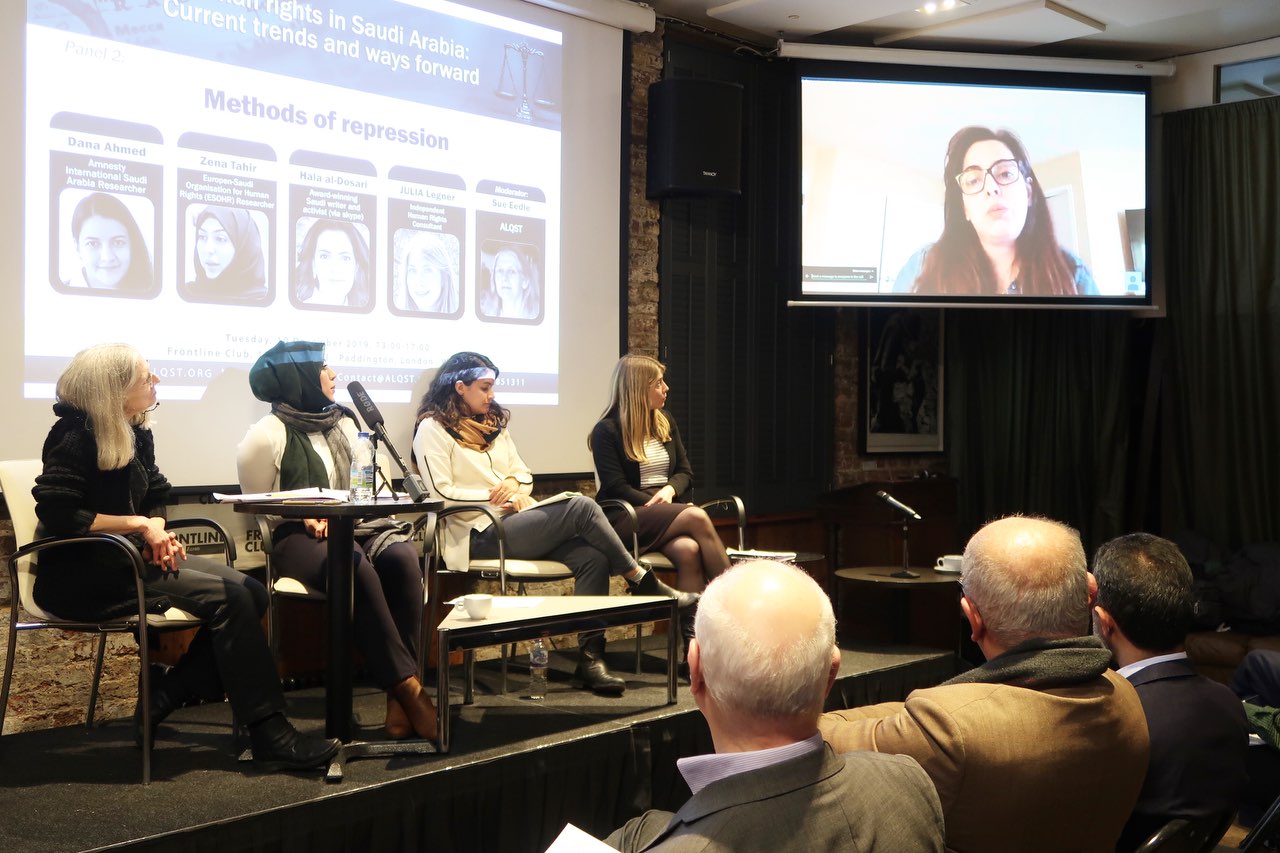
Session two: methods of repression
In the second session (moderated by ALQST’s Sue Eedle), titled methods of repression, Dana Ahmed, Gulf researcher at Amnesty International, spoke about Saudi Arabia’s Specialised Criminal Court (SCC). Although set up in 2008 to hear terrorism cases, it has since been used systematically, along with laws such as the Counter Terrorism Law, to prosecute human rights defenders and dissidents. Ahmed argued that the Saudi authorities justify the arrest and sentencing of peaceful activists by using such vague laws to claim that the charges are not related to freedom of expression, and to make it more difficult for the international community to intervene.
In February 2020, Amnesty International published a report, titled “Muzzling critical voices: Politicized trials before Saudi Arabia’s Specialized Criminal Court” , showing how the Saudi authorities are using the Specialised Criminal Court (SCC) as a weapon to systematically silence dissent.
Julia Legner, an Independent Human Rights Consultant and ALQST’s Head of Advocacy, spoke on the legal framework (or lack thereof) used to crackdown on peaceful dissent. Given the absence of a Criminal Code in Saudi Arabia, legislation can be interpreted in a way to include a wide spectrum of offenses. This includes the Anti-Terrorism Law, which defines terrorism in vague terms and encompasses a wide array of non-violent acts, including “disturbing the public order”. Additionally, vague provisions of the 2007 Anti-Cybercrime Law are used to charge and try Saudi citizens for peaceful and critical publications on social media comments.
Legner also spoke about the restructuring and centralisation of the Security Apparatus since King Salman acceded to the throne in 2015. This includes making his son MBS Minister of Defense and later Crown Prince, a royal decree in June 2017 severing the Bureau of Investigation and Prosecution (BIP) from the Interior Ministry and re-establishing it as the Public Prosecution reporting directly to the King, and King Salman’s creation of a new agency, the Presidency of State Security, which absorbed the intelligence and counterterrorism functions formerly held by the Interior Ministry.
Zena Tahir, a research associate for the European-Saudi Organisation for Human Rights (ESOHR), spoke on the use of the death penalty and exeuctions in Saudi Arabia. Saudi Arabia remains one of the top executioners in the world, with a large spike in recent years. 2019 witnessed a total of 185 executions, the highest since the mid-1990s. Tahir argued that we have seen a gradual widening of death penalty, with all forms of society now at risk. This includes religious figures such as Salman al-Odah and Hassan al-Maliki, women such as Israa al-Ghamgham (who is no longer facing the death penalty as a result of international pressure) as well as minors, with 12 juvenile defendants currently at risk of execution.
In terms of what can be done, Tahir called on international actors to pressurise Saudi Arabia for a moratorium on the use of the death penalty, and empahsised the importance of lobbying, as seen by the case of Israa al-Ghomgham and Murtaja al-Qureris (both who had death penalties reversed), but that such pressure must be sustained.
Hala al-Dosari, award-winning activist and writer, spoke about women’s rights in Saudi Arabia and the male guardianship system, a set of policies, laws and practises that restrict women based on the role of a male guardian. This includes in terms of access to marriage, travel, official documents, civil status of family members, educational opportunities, government or private sector jobs and accomodation.
Al-Dosari spoke of the long and hard struggle over the last decade to dismantle it, including legal battles for the custody of children by mothers and right to drive campaigns by women’s rights activists. Such efforts have gained some modest reforms, including the 2013 protection of abuse law (the very first definition of the male guardianship system in written law), the 2015 freedom of association law, a 2017 royal decree instructing ministries to review practises, and the lifting of the female driving ban, the implementation of which in 2018 also coincided with the mass arrest of women’s rights activists and a public defamation campaign.
2019 saw some further restrictions eased, including the right for women to travel without a male guardian, but Al-Dosari argued that the system has not been dismantled, and control of women by male guardians remains, including in terms of marriage and divorce. Indeed, only some women will benefit from these changes, but not others like those from conservative families or those that are victims of violence, in which cases the government will not take the side of women. While the government is happy to see women be more productive as consumers, they do not want to help them reach their potential as equal citizens. Al-Dosari concluded by emphasising that the key to understanding Saudi Arabia is not the leadership or the elite but the Saudi people, whose voices must be amplified.
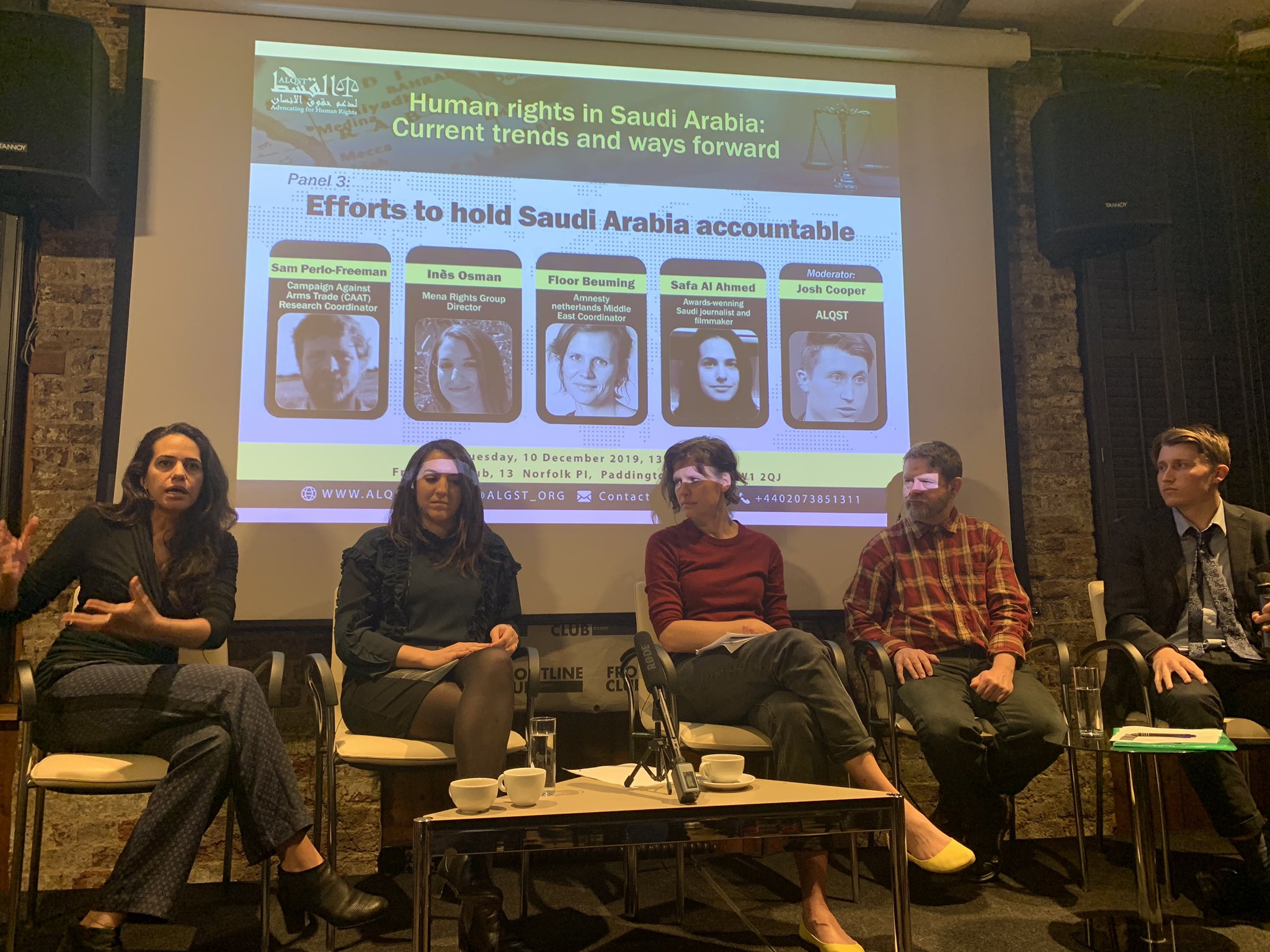
Session three: efforts to hold Saudi Arabia responsible
In the third and final session, efforts to hold Saudi Arabia responsible (moderated by ALQST’s Josh Cooper), Sam Perlo-Freeman, Research Coordinator at Campaign Against Arms Trade (CAAT), spoke about the brutal war in Yemen, which began in March 2015 and has since led to over 100,000 deaths and the world’s worst humanitarian disaster, with 24 million people in humanitarian need. The conflict, and the role of the Saudi-led coalition, has been made possible by arms supplies from the UK and US, with over half of the Saudi air force’s striking ability coming from the UK and thousands of British contractors on the ground in Saudi Arabia supporting and maintaining Saudi air force. If the support from the UK would stop, argued Perlo-Freeman, then Saudi involvement would stop within a week.
Perlo-Freeman described the judicial review, led by CAAT, and the groundbreaking 20 June 2019 ruling by the Appeal Court which found the UK government’s current procedures to be unlawful, and that export licensing should not be granted if there is a clear risk of breach of International Humanitarian Law (IHL), which Saudi Arabia has repeatedly been violating. As a result of this ruling, the UK government now has to review licensing decisions and retake those decisions around this basis, and is not allowed to make new licences in the meantime. The UK government is appealing this decision, and it is not known when the supreme court ruling will be.
Safa Al Ahmed, award-winning journalist and filmmaker, said that while public distaste has increased around Saudi Arabia, governments are still not doing enough, not least the UK and the US. It is an illusion to think, because ordinary people are now beginning to find the actions of the Saudi government to be unpalatable, that their own governments are changing their views. Al Ahmad spoke on the importance of finding a tipping point, by which governments will be more responsible to public opinion, and emphasised the need for international civil society to collaborate more, build creative resistance and better solidarity.
Al Ahmed also spoke about Saudis in the diaspora and exile, and that with the Saudi authorities targeting and attempting to divide them, it is vital they are supported and their voices are amplified. Meanwhile, Saudi Arabia continues to completely deny the reality of the human rights situation, for example by claiming that women’s rights have improved while refusing to talk about the women in prison.
Inès Osman, Director of MENA Rights Group, gave a summary of actions at the UN Human Rights Council (UN HRC) over 2019, the last year of Saudi Arabia’s membership of the Council (2007-2019). It was largely a successful year for advocacy, including with the release of Agnes Callamard’s report into the killing of Jamal Khashoggi, and two joint statements on human rights in Saudi Arabia. The first was a landmark statement in March 2019 led by Iceland, which rebuked Saudi Arabia’s record for the first time at the UN, and a second statement in September led by Australia was broader in its scope and stronger in its language, but also resulted in less states signing onto it, such as France. Osman described such UN action as a highly political process, and pointed to the importance of a resolution at the council to establish a monitoring mechanism over Saudi Arabia, but that achieving this will be difficult.
Osman raised the importance of civil society continuing to keep the pressure up, including campaigning around sporting events. For example, a tennis tournament scheduled to take place in Saudi Arabia was cancelled, and the Dakar Rally is due to take place in Saudi Arabia over the next 5-10 years, raising the need for civil society to be active around sporting investment in the country.
Floor Beuming, Middle East Coordinator at Amnesty Netherlands, described that western governments are not acting in the way human rights organisations would like, such as by raising human rights violations at the highest level and monitoring trials. Many diplomats are taking a “glass half full” approach, by claiming that the Saudi public really support MBS, despite not being able to verify this. Outside of the UN HRC, at the political level there has hardly been any public statements. Instead, politicians say they are doing things behind closed doors, but we now insist on them doing it publically.
Beuming pointed to the G20 as a great opportunity to put pressure governments in the EU. EU member states in fact have a series of guidelines and commitments to raise human rights issues, and NGOs can remind them of this. While the Saudi government will try and use G20 to boost their image, for example on their website they have listed an aim of the G20 as “unleashing access to opportunities for women”, human rights activists will be using this to push for real reform.
ALQST would like to thank all of the speakers, those who attended, and those who followed online, for their continued support.
